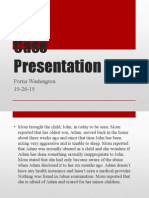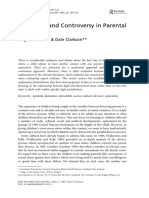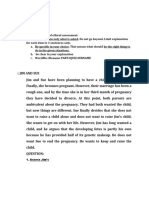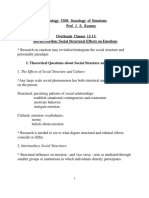Module 5 – Abuse and Neglect Assignment
Work in a group, as assigned by your instructor.
Choose a group member to record the answers for the group.
Discuss the following scenarios and record your answers on the assignment sheets provided.
One assignment will be submitted per group—each member will receive the same
mark,provided all participants contributed equally.
Submit your answers to your instructor at the end of the session.
Assignment is out of 30 marks..
Each group member will receive the same mark,provided participants contribute equally.
The assignment will count for 40% of your final mark Module 5.
Name: Haseeb Qureshi
Date: October 23,2024
Case Study 1:
�Mrs. Green is your client. She is 78 years old and has progressive degeneration of her hip joints
that makes it very difficult for her to get out. You have been visiting her for three weeks, helping
with the vacuuming, washing, and providing some social contact. Although Mrs. Green seems to
want you to continue coming to see her, you notice that she is very anxious about your leaving
on time. You feel that she is probably worried about the costs of your visits and wants to make
sure that she isn’t charged for extra time. You’re aware that Mrs. Green has a daughter and,
although she doesn’t say much about her, you get the feeling that the daughter does visit. You
have never met her, though. At the end of your last visit, Mrs. Green’s washer backs up, spilling
water all over the basement. Mrs. Green becomes very anxious, saying to you that, “It’s alright:
the water won’t hurt the floor. You’d better go, you’ll be late.” You can’t just leave the water on
the floor and insist on cleaning it up. Somewhat reluctantly, Mrs. Green decides to let you do
this and returns upstairs. Just as you’re finishing, you hear the door. A younger woman speaks
to Mrs. Green. You notice that her tone is harsh as she says, “You’re out of milk and bread?
What did you do with all of the food I brought last week? Feeding those damn birds again— you
don’t have enough sense to make sure that you keep food for yourself. Now I have to get stuff
because you’ve wasted what you had. Sometimes you act as though you don’t have a brain in
your head.” Concerned, you put away the last of the cleaning supplies when you hear the
younger woman say, “Whose coat is this?” When Mrs. Green replies that it is yours, the woman
continues, “What’s the matter? You aren’t satisfied with all that I do? You have to invite some
stranger into your house? Where are you getting all the money for this?” You go to the top of the
stairs. The younger woman says to you, “Thanks for your help, but my mother won’t be needing
you anymore. I’ll make sure that you’re well paid for today.” Mrs. Green looks miserable, but
helpless. She looks down at the floor.
1:Describe all the feelings that you (or other PSWs) might have in this situation. Explain
how they might be helpful or unhelpful in resolving the problem. (2 marks)
The PSW might be concerned about Mrs. Green's emotional and physical health given her
daughter's unkind behavior. The PSW could be feeling annoyed by the daughter's indifferent
demeanor and how it affects Mrs. Green's independence. There might be a deep sense of
understanding for Mrs. Green, who seems to be grappling with both her physical constraints and
her connection with her daughter.
The PSW may be motivated to advocate for Mrs. Green's needs and well-being if they feel
concerned. Effective communication with Mrs. Green and understanding her fears can be
facilitated by empathy. A defensive response towards the daughter, potentially escalating the
conflict rather than resolving it, may result from feelings of frustration. Remaining professional
and focused on Mrs. Green's needs is essential.
2. List three behaviors of Mrs. Green’s that indicate she may be abused. (3 marks)
�The information gathered about Mrs. Green suggests that she might be afraid of facing financial
consequences, as she appears overly concerned about time and expenses, indicating a need
for financial stability. In addition, her initial insistence that the water would not damage the floor
and her wish for the PSW to leave may demonstrate her discomfort in expressing her own
needs and preferences. Furthermore, Mrs. Green's response to her daughter's harsh words and
her submissive behavior, such as avoiding eye contact, could indicate a tendency to avoid
conflict, which might be a sign of emotional or verbal mistreatment.
3. In this situation, describe how power is being exerted over another person. (2 marks)
The daughter is using her authority to control Mrs. Green through harsh words and controlling
actions. The daughter's language and demeanor indicate a disregard for Mrs. Green's
independence, implying that she believes she has the right to determine her mother's lifestyle
and caretakers. This situation demonstrates an unequal dynamic in which the daughter's power
and negative approach diminish Mrs. Green's self-respect and freedom.
4. What action is appropriate for the PSW to take in this situation? Why? (3 marks)
The personal support worker (PSW) should kindly communicate to the daughter the significance
of Mrs. Green's independence and her request for assistance. For instance, I understand that
you're worried about your mother, but she appears to value my visits and help.
The PSW should give priority to Mrs. Green's emotional well-being, possibly proposing a further
conversation or providing supportive resources that honor her preferences.
The PSW should record the interactions and any potential signs of abuse, then follow
appropriate procedures to report these concerns to a supervisor or the relevant authority to
ensure Mrs. Green gets the necessary support.
These actions are essential for safeguarding Mrs. Green's welfare and respect, as well as
addressing the possible emotional abuse she may be enduring. Advocating for her while
upholding professionalism helps establish a safer environment for her.
Case Study 2
�You have been assigned to care for the Ross family. The family just had triplets: three
girls. The girls were premature, but they are now home after two months in hospital.
There are two older children in the family, Ray, age two, and Lori, age five. Although
maternal and paternal grandparents are all living, they reside 1600 km away and cannot
visit to help. The family seems to be loving and close-knit. The parents seem very
happy with the new additions— although they admit that the birth of three was very
much a surprise. You have been with the family for two months and over that time have
noticed a change in Ray. He seems less able to run as steadily as he did before. As
well, he seems to be using more “baby-talk,” not speaking words as clearly as he once
did. He also seems to be more fearful. Today is your day off. You find yourself in the
Ross’ neighbourhood and decide to say hello. As you go up to the door, you see Mrs.
Ross violently shaking her son. She is visibly upset and is speaking to him in a very
angry voice.
1. Describe all the feelings that you (or other PSWs) might have in this situation. Explain
how they might be helpful or unhelpful in resolving the problem. (2 marks)
● The PSW might experience significant concern for Ray's safety and well-being when
observing Mrs. Ross shakes him and speaks angrily, which raises concerns about
potential abuse.
● There could be a strong feeling of understanding and compassion for Mrs. Ross,
acknowledging that she may be overwhelmed and finding it difficult to manage the
responsibilities of caring for five children, including three newborns.
● The PSW may feel a sense of frustration about the situation, particularly if they have
been establishing a connection with the family and had hoped for a positive environment
for the children.
The PSW can be motivated by concern and empathy to intervene with compassion, providing
support to both Mrs. Ross and Ray, and promoting a safe environment.
If frustrated, there is a risk of adopting a confrontational approach, which could worsen the
situation or cause Mrs. Ross to become defensive, impeding effective communication and
resolution.
2. Identify the possible reasons for the angry outburst in Mrs. Ross. (3 marks)
a. The unexpected arrival of triplets, along with the responsibility of looking after two
older children, could result in high levels of stress and feeling overwhelmed, leading her
to react strongly.
�b. Insufficient sleep and the challenges of taking care of multiple babies might add to
her edginess and annoyance, making it more difficult for her to control her feelings.
c. If Ray was engaged in something seen as risky or disruptive, Mrs. Ross's anger
could come from a protective instinct, even though it was expressed inappropriately.
3. Identify two behaviors in Ray that indicate that he may be abused. (2 marks)
a. It seems that Ray is becoming more and more anxious, which could indicate that he is feeling
uneasy or worried in his environment. This could be a sign that he is being mistreated or going
through emotional distress.
b. If he is reverting to using baby-talk and struggling to express himself clearly, it could be a sign
of stress or trauma. Children often go back to old behaviors when they feel unsafe or in danger.
4. What action is appropriate for the PSW to take in this situation? Why? (3 marks)
The PSW must handle the situation calmly, talking to Mrs. Ross in a non-confrontational way to
ease the tension and shift her focus. Approaching the situation calmly can help reduce the
tension and make Mrs. Ross more open to receiving support.
After confirming that the immediate situation is secure, the PSW should connect with Ray to
evaluate his emotional and physical condition. That's why It is crucial to ensure Ray's safety and
well-being, and understanding his emotions can provide insight into the situation.
The PSW should kindly propose that Mrs. Ross thinks about seeking additional support, such as
assistance from family members, counseling, or parenting resources. Providing resources can
help alleviate some of the stress she is experiencing, creating a healthier environment for both
her and the children.





















































































